22 May 2024
![]() 8 mins Read
8 mins Read
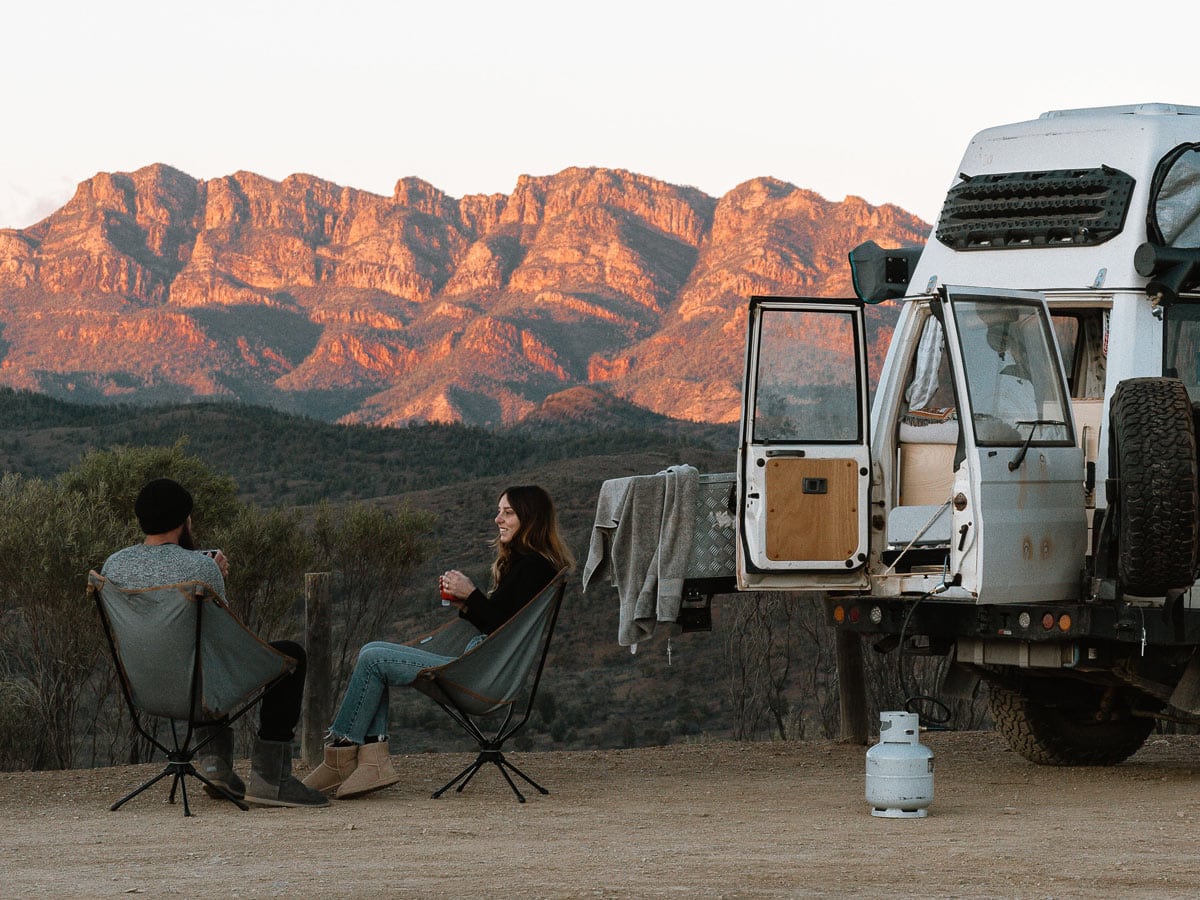
The broad horizons, endless vistas and wide-open roads of the Flinders Ranges mean you’ll never feel crowded in this corner of the country. But if you really want to settle into the pace of outback life, there’s no better way than spreading out a tent (or swag) and spending a few nights under the stars.
There are caravan parks with plenty of services dotted all along the ranges from Rawnsley Park to Arkaroola, but you’ll also find stylish glamping tents and remote bush sites among the best Flinders Ranges camping options.
Located directly beneath the imposing ramparts of Ikara (Wilpena Pound), Rawnsley Park Caravan Park puts you in the heart of the action and makes an excellent base from which to explore the central Flinders Ranges.

Camping at Rawnsley Park Station is an awe-inspiring experience. (Image: South Australia Tourism Commission)
More than 50 powered and unpowered sites are scattered among the native pines and river red gums surrounding the main facilities, while the more secluded bush camping sites allow you to escape the crowds and take in magnificent sunsets and sunrises in solitude.
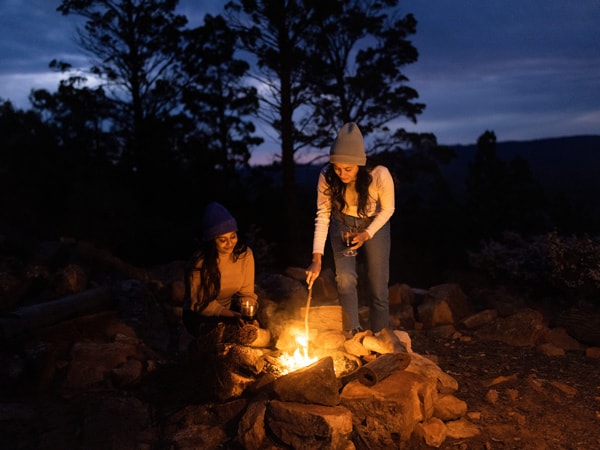
Light a campfire under the stars during your stay. (Image: South Australian Tourism Commission)
Cost: Powered sites from $43 per night, camping from $30
Facilities: Camp kitchen, amenity blocks, swimming pool, shop, restaurant, paid pet-minding service
4WD required: No
You could spend a lifetime exploring every nook and cranny in the 95,000-hectare Ikara-Flinders Ranges National Park, but it’s worth slowing down every now to observe how the angle of the sunlight dramatically alters the colour of the rocks throughout the day.

Ikara-Flinders Ranges National Park is full of jaw-dropping spots to sit and take in the views. (Image: As We Wander)
The 10 campgrounds spread throughout the park are ideal for campers keen to spot some of the local wildlife and take things at a more relaxed pace.
Among the pick of the bunch are Acraman, which is located in a saddle that fills with wildflowers each spring, and Trezona, which provides access to the geological wonders and rock wallaby colonies of Brachina Gorge.
The hike-in Wilcolo Campground is a beautiful spot to spend a few days, while Dingley Dell has limited shade but is just a short walk from the Perawurtina cultural site that is known for its many Adnyamathanha rock carvings.
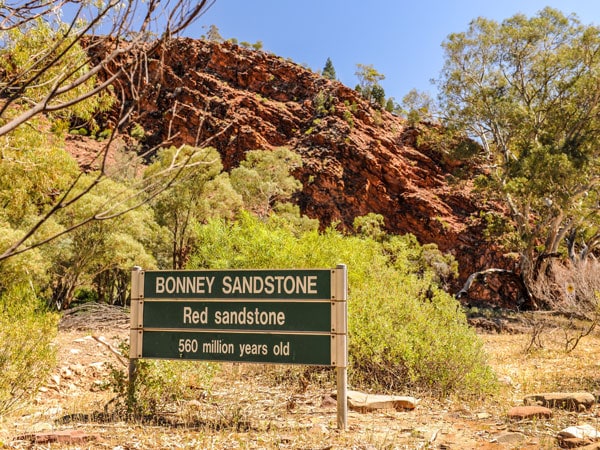
Explore the rugged Bonney Sandstone in Brachina Gorge. (Image: South Australian Tourism Commission)
Cost: Camping from $25 per night
Facilities: Long drop toilets, fire pits
4WD required: It varies – check individual site listings
With 40 powered sites and 300 unpowered sites scattered beneath groves of majestic river red gums, you’ll have your work cut out choosing the very best spot at Wilpena Pound Caravan Park.

Ikara (Wilpena Pound) is stunning from above. (Image: Emile Ristevski)
Fortunately, all of them have excellent views of Ikara (Wilpena Pound) and their proximity to the entrance means that you can see the Flinders Ranges’ crown jewel in its best light on a morning or afternoon walk without having to worry about driving home in the dark. Wilpena Pound Resort also offers a range of cultural and scenic tours.
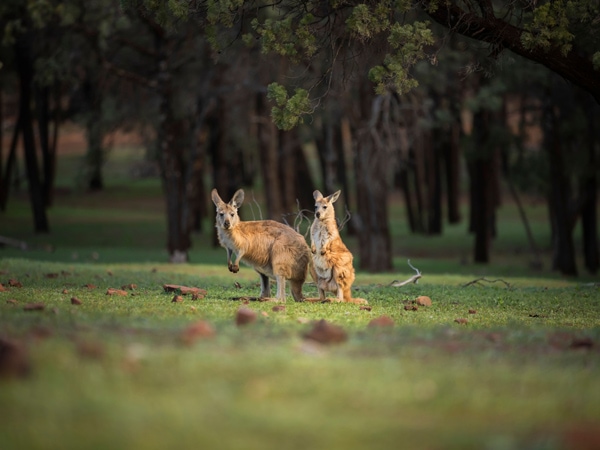
The campground within Wilpena Pound Resort is brimming with wildlife. (Image: Tourism Australia)
Cost: Powered sites from $50 per night, camping from $31
Facilities: Camp kitchen, amenity blocks, swimming pool, general store, wifi in communal areas
4WD required: No
Located just to the north of Ikara-Flinders Ranges National Park, this broad gorge scythes through the ranges from east to west. An unsealed road winding between sheer cliffs and around rocky peaks is one of the most accessible scenic drives in the region and dozens of unmarked sites are spread out beside the road over several kilometres.

The nearby Angorichina Station is nestled within the hills. (Image: Angorichina Station)
Emus, kangaroos, wallabies and an abundance of birdlife combine to make this among the most pleasant campsites in the region, though most of the gorge floor is subject to flooding and it is unsuitable for camping after rain.
There is no phone reception in Parachilna Gorge and campers need to bring their own water, food and firewood; the nearest store (and toilets) can be found at Angorichina Tourist Village, which also has powered and unpowered sites. If you’re looking for Blinman Pools camping, these are the two closest options.

Camping in the Flinders Ranges never fails to deliver wildlife encounters. (Image: Anthology Travel)
Cost: By donation
Facilities: None
4WD required: No, but a high-clearance vehicle is highly recommended
There is no Blinman Caravan Park, so the closest option is ONYA Eco-Camping Park three kilometres to the south. The self-sufficient campsites here are much quieter than most caravan parks, and the spacious sites are intentionally spread out so that visitors have plenty of room to take in the surrounding landscape.
An emphasis on protecting the natural landscape means there are no pets allowed, but the friendly owners run a range of activities including children’s programs during the school holidays, as well as providing access to a community library stocked with books, DVDs and board games.

Soak up the surrounding landscape in Blinman. (Image: South Australian Tourism Commission)
Cost: $20 per vehicle
Facilities: Shop, community library
4WD required: No
The tortuous bends, buckles and folds in the deep red rocks around Arkaroola Caravan Park mean that every one of the 50 powered sites is blessed with an iconic outback view, as are the 300 hectares of bush campsites spread along the banks of a dry creekbed.

Spread across Arkaroola Wilderness Sanctuary are the 300 hectares of bush campsites. (Image: Tourism Australia; South Australian Tourism Commission)
It’s not unusual to see kangaroos and emus wandering between the tents, and the abundance of walks, drives and tours in the region could keep you busy for a week. Because this is a remote, self-sufficient property, there are no dump facilities and campers should bring as much drinking water as possible.
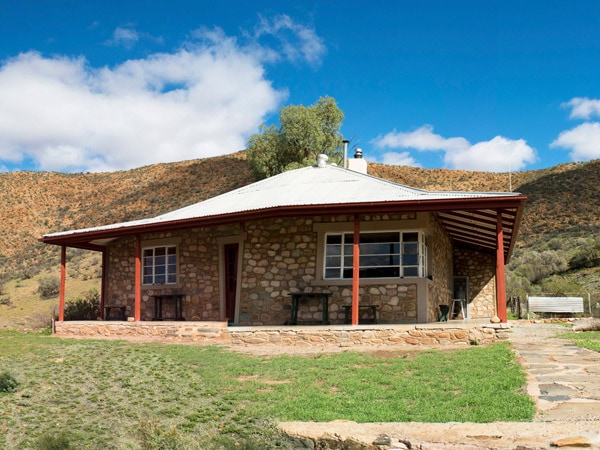
Stay in the remote Grindalls Hut, Vulkathunha-Gammon Ranges National Park. (Image: South Australian Tourism Commission)
Self-sufficient campers can also use a range of campsites in nearby Vulkathunha-Gammon Ranges National Park.
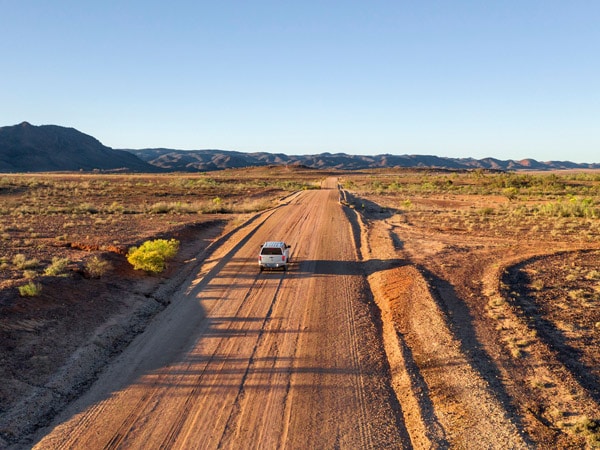
Drive along the spectacular terrain in Vulkathunha-Gammon Ranges National Park. (Image: South Australian Tourism Commission)
Cost: Powered sites from $25 per night, camping from $16
Facilities: Camp kitchen, amenity blocks, swimming pool, general store, restaurant, communal fireplace, wifi in communal areas
4WD required: No
If you want to feel close to nature but still need a few creature comforts, check in to one of the 15 Ikara Safari Tents near the Wilpena Pound Campground and you can enjoy the best of both worlds.
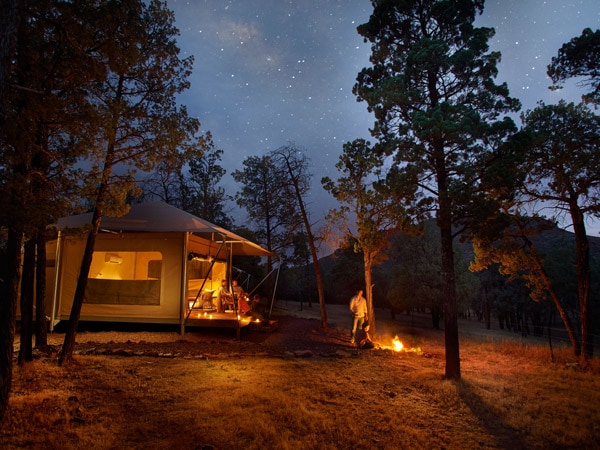
For a taste of camping without sacrificing on creature comforts stay at Ikara Safari Camp (Image: South Australia Tourism Commission)
Put the kettle on and fend off the chill of cool outback nights as you sit around the fire pit and gaze up at the Milky Way, safe in the knowledge that a good night’s sleep awaits in a roomy suite with an ensuite and reverse cycle air-conditioning. The king beds can be split into two singles, while the supersized family tents can fit up to four guests.

The safari-style tents make for a cosy abode close to nature. (Image: Anthology Travel)
On a station just outside Hawker, Flinders Bush Retreats has a single glamping tent with a small kitchenette, composting toilet and wool blankets to keep you warm at night, plus a welcome bottle of sparkling to make the stars shine extra bright.
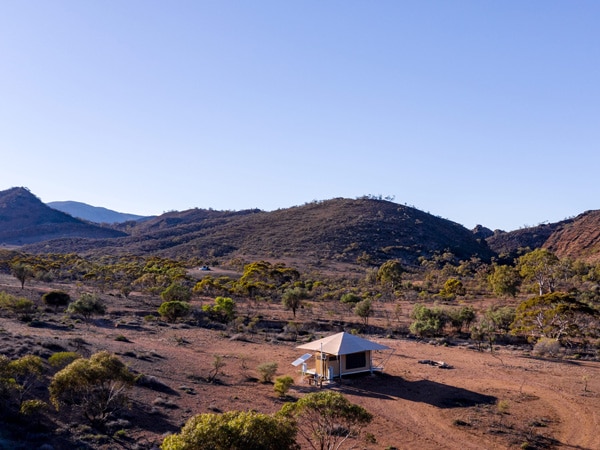
Stay in a secluded spot at Flinders Bush Retreats. (Image: Isaac Forman)
When planning a Flinders Ranges camping trip, it’s important to remember that this is a remote region and many areas do not have mobile phone service. Inform someone of your plans and expected return date before setting out and always carry several day’s worth of extra food and water.

Be prepared for all scenarios while camping in the Flinders Ranges. (Image: Thomas Quan)
Many gorges are prone to flash flooding and dirt roads can be impassable after rains, so always keep an eye on the weather.
There is a total fire ban between 16 October and 15 April, and the season may be extended if conditions necessitate it.
Pets are not permitted in Ikara-Flinders Ranges or Vulkathunha-Gammon Ranges National Park.
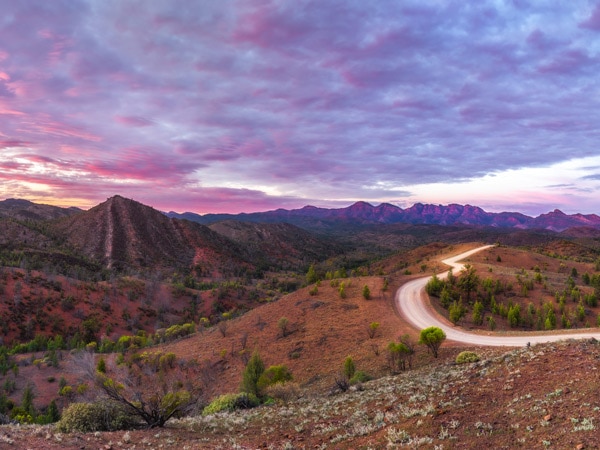
The Flinders Ranges is rich in beautiful, rugged landscapes. (Image: Michael Waterhouse Photography)
LEAVE YOUR COMMENT